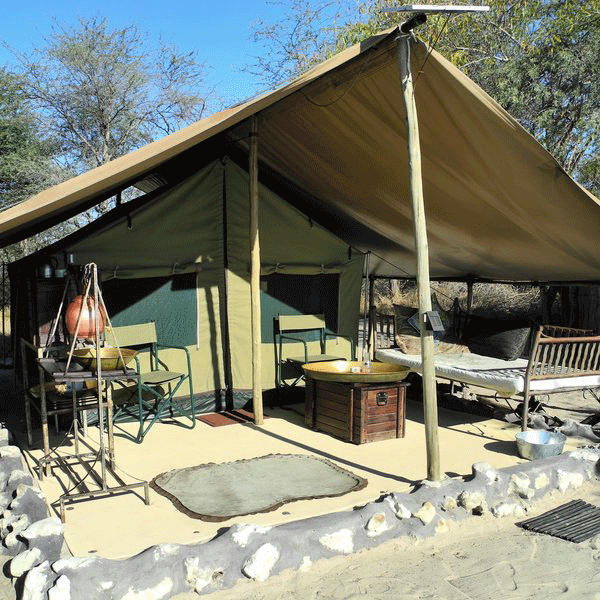Botswana possesses some of the last remaining wilderness areas on the globe, including the Okavango Delta, which has been nominated as a UNESCO World Heritage Site. It is of high priority that as we visit and bathe in the wonderment of this wild country, we contribute to the preservation of its wildlife, its local villages and its landscape. Africa’s Finest is David Bristow and Colin Bell’s glossy publication highlighting the most ecologically sustainable safari establishments on the continent, and tucked between its pages is one of Botswana’s most eco-friendly camps, just on the border of the Delta wetland.
Meno A Kwena, meaning “Teeth of the Crocodile”, was built by David Dugmore, a daring believer who persisted in his quest to deliver a functional, yet gentle, safari camp in this remote wasteland where water had not flowed for over a decade. Stunningly positioned high up on the Boteti riverbank, in between the Okavango Delta and the Makgadikgadi salt pans, Meno A Kwena had the potential to enrich the lives of visitors and facilitate an income into the poor farming community nearby.
As is a devastating issue all over Africa, here, human-wildlife conflict contributed significantly to the decline of delicate animal populations in the area. The Boteti River, when it flowed with life, quenched the thirst of hundreds of thousands of zebra and wildebeest as they began their famous migration across the Serengeti and the Masai Mara. The lack of alternative water sources and the encroaching human population in the area bore a cruel competition between the survival of cattle and that of wildlife. The erection of fences further disturbed this seasonal influx of animals into the area, and soon, only a fraction of zebra, wildebeest and elephant moved through the area.
David Dugmore recognised the need for water in the region where the Boteti River was once relied upon. He took to action and assisted the National Parks authorities in pumping artificial waterholes on the dry borders of the Makgadikgadi National Park. He also built and maintained a small 15 000 litre swimming pool at Meno A Kwena (which he established in 2003) that served as a back-up water source for if/when the earth was completely dry. In addition to his help in keeping the animals watered and encouraging the continuation of Southern Africa’s greatest migration through the area, Dugmore engaged with the local Moreomaoto community and created a beneficial exchange.
Beginning with leasing the land from the villagers, Meno A Kwena exists to serve the community members as much as it does the visiting guests on a quest for a raw African experience. Utterly comfortable and understated, Dugmore has built and maintained a retreat that, since the Boteti once again rushes with life, offers safari-goers a splendid view of the river and the plethora of species that make use of this vital resource. Slow-paced and culturally enriching, a few days spent at this tented camp will revitalise one’s perspective on how we should be accountable for maintaining such natural beauty.
Of course, solar energy powers the place, while bucket showers (elegantly suspended copper vases) ensure that no water is wasted. The staff are employed from the local village, adding value to both guests’ experiences and the lives of the families who are supported by staff salaries. Local materials, crafts and handiwork are used around camp to make sure that it functions optimally for relaxation and ease.
Traditional game drives are conducted in the neighbouring Makgadikgadi National Park, while an interesting tour with the local Bushmen can be enjoyed at camp. Hammocks hover over the sand and overlook the wide river below, while the décor around camp is innovative and aesthetically pleasing (note the parachute ceiling over the dining table).
Go with the meandering flow at Meno A Kwena and know full well that your holiday expense is contributing to the conservation of this vital passage of the Great Migration and encouraging the harmonious existence between humans and wildlife in Botswana.
Contact us to book at Meno A Kwena in Botswana’s Makgadikgadi Pans.







